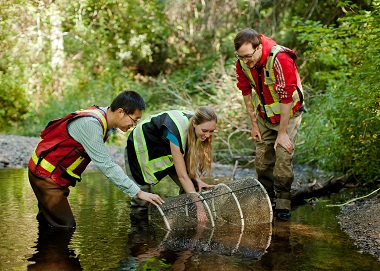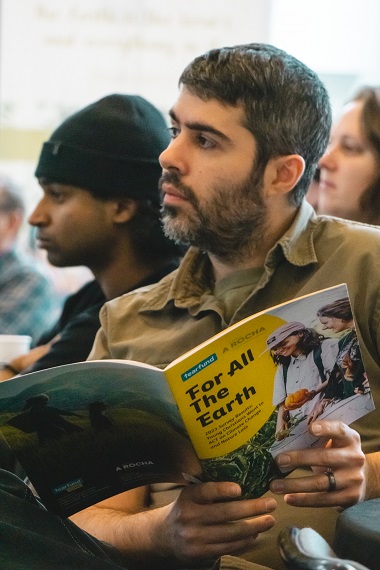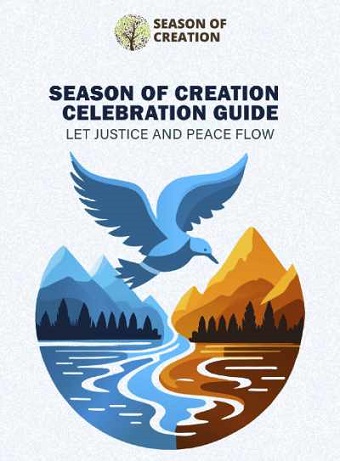
Rick Faw loves to spend time outdoors. Photo: Hannah Mae Henry
What is one thing you can you do to make our world a better place for everyone?
Eco-anxiety is plaguing the minds of so many. A recent secular survey said that 39 percent of students won’t be having children because of their concern over climate change.
Church leaders are having a minimal influence on our upcoming generation – but church youth do want to understand how their Christian community might help integrate faith and current issues.
Through a recent survey by Tearfund Canada and A Rocha Canada, young Christians made their passions clear about creation care.
Of the 742 youth surveyed, 90 percent said they are worried about climate change and nature loss. 91 percent said it is important to act now, and 92 percent said creation care is an essential act of discipleship for every Christ follower living out the gospel message.
Many feel the church is absent from taking leadership in this area but feel that this is a vital way to link personal faith with the global issue facing all of us.
A new initiative of churches and organizations called the Creation Collective has been formed to address the concerns and to stimulate followers of Christ into action.
Credibility of the gospel
Rick Faw, Education Director for A Rocha Canada and an active leader since 2004, combines his science and theology training with a love for outdoors. The passion for creation care is evident as he expounds the biblical foundation which drives his effort.
Growing up in a Christian environment with church and school, it wasn’t until he was a young adult that Faw learned that God cared about all creation and that Christ was reconciling all things to himself. His faith became his own as his convictions grew.
The implications are dramatic for the church and the world. Faw says:
The credibility of the gospel is at stake. People will dismiss the church if we don’t get engaged in the ecological factors that are defining our times. People are asking, ‘what are you doing or saying about things that affect everyone on our planet?’
We offer the world a way to engage defining issues with a grounded hope, a rootedness in the faith of God. The answers of the world are not enough. There needs to be something else. The church can model a care of creation serious and thorough enough to let people say we get it without losing joy.
Changing attitudes

Photo: A Rocha Canada / Whitney Buckner
May 27 was set aside as an action day for churches. Tearfund published 50 Creation Care ideas for churches which focused on worship and discipleship, personal lifestyle, facilities, outreach in community and global initiatives.
The partnership for Tearfund and A Rocha grew out of a shared core of beliefs when Tearfund’s Wayne Johnson and A Rocha’s Luke Wilson spun their passions together into the vision of a joint survey.
Faw notes that the change in attitudes among followers of Christ over the past 20 years is significant. He’s been called a heretic in the past for his focus and people have considered creation care a distraction, unsure what the gospel has to do with stewardship of the earth. A founder of the Sierra Club once questioned him about Christian’s commitment to the earth and suggested that Christians were the problem and not the solution to our climate issues.
Now, Faw is given head nods to what he says and some even ask what they can do. Some say ‘I want to do something but I’m overwhelmed.’
Biblical passages roll easily off of Faw’s lips since he has a deep-rooted theology for his practices.
We are created for relationship with God, others and creation. We need to understand the implications of Colossians 1, John 3:16 and Revelation 21 where Christ creates, sustains and makes all things new.
Since Genesis 2:15 this is God’s project from day one. Sin and rebellion have thwarted all this but in Philippians 2 Christ lays down his life so we can flourish. We are called to live in such a way that all those under our care can flourish.
When we do this it isn’t burdensome. We are created to do this. In this way we become fully alive like John 10:10 says. We don’t engage in environmentalism because of the crisis but because this is our purpose for being.
Tearfund / A Rocha

Participants at the Tearfund / A Rocha survey presentation at Tenth Church April 19. Photo: Dannie Piezas (A Rocha Canada)
Tearfund’s vision is “to see people freed from poverty, living transformed lives, and reaching their God-given potential.
They partner with more than 350 church-based organizations in over 50 countries. In their effort to alleviate impoverishment of the whole person their focus on creation care states that they “recognize that the fall didn’t just impact humanity but all of creation.”
A Rocha describes itself as an international Christian organization which, inspired by God’s love, engages in scientific research, environmental education, community-based conservation projects and sustainable agriculture.
Cultivate
“We need to cultivate wonder and gratitude,” says Faw:
Start with what you love. Cultivate flowers, clean up a beach, grow food. Ride a bike. Take transit. Explore something hands on. Go out and touch, explore, elicit curiosity. Get to know your place through an interpretive walk.
Most of the biblical story is outdoors. Get to know your human and nonhuman neighbours. Check out the birds. Get in touch with the seasons. Ask yourself questions like when it rains – what is it like for people who don’t get rain? Do something practical. Join a conservation group and pull invasive species. Pick up garbage. Ask neighbours how you can help?
For churches, he suggests having an outdoor service and drawing attention to God’s care of his world. “Youth would love it. We have lost our childlike awe. Our children are Christlike.”
 He suggests a resource called Season of Creation. The survey pointed out the importance of the church to preach, teach, adapt worship and to engage youth with hope. It doesn’t mean radical change.
He suggests a resource called Season of Creation. The survey pointed out the importance of the church to preach, teach, adapt worship and to engage youth with hope. It doesn’t mean radical change.
Bible studies and discipleship can incorporate lessons on creation. Even the Lord’s supper has core elements of the earth in wine and wheat. Songs like ‘All Creatures of our God and King,’ ‘How Great Thou Art’ and some contemporary pieces can draw attention to the world around us. Guest speakers like Faw can draw attention to the issue.
Refugia
The focus on the environment might be a generational trend with the young at the forefront, but there are many advocates, including gardeners, farmers and those who love nature. We can learn from each other on how to uphold and steward the land and environment around us. Churches can ask how to uphold food producers and to express value for what they do. Students are asking for insight on how to combine faith and creation care so they can share more effectively.
 A UBC grad who visited A Rocha had been inundated with the fearful statistics of climate change but had no way to engage meaningfully. Her visit gave her direction, meaning and purpose to make a difference. We aren’t the saviours of the world but we can engage right where we are. “Young adults need permission and blessing.”
A UBC grad who visited A Rocha had been inundated with the fearful statistics of climate change but had no way to engage meaningfully. Her visit gave her direction, meaning and purpose to make a difference. We aren’t the saviours of the world but we can engage right where we are. “Young adults need permission and blessing.”
Debra Rienstra has introduced an ecological term called ‘refugia’ (Refugia Faith). After a volcano or fire little pockets of plants survive and provide a seedbed for the renewing landscape. Over time they link up and provide pollination to bring life back to the environment.
“That’s what we Christians are to do,” says Faw. “To be refugia where creatures and people survive. To be protectors of community.” To stimulate flourishing life.
A journey of small steps
“Just talk about it and do something simple,” Faw encourages. “Discipleship is a journey of small steps.”
A Rocha and other organizations like it are eager to help in any way possible. The Creation Collective hopes to add major momentum to the movement of Christ followers who are taking seriously our mandate to steward God’s good work. The healthy faith of our next generations may depend on initiatives like this.
Christianity Today recently posted a related article: Canadian Christians Launch Collective for Climate Action.’ An April 19 article on Church for Vancouver described the unveiling of the Tearfund / A Rocha report in Vancouver.
Go here to learn more about the Creation Collective.
